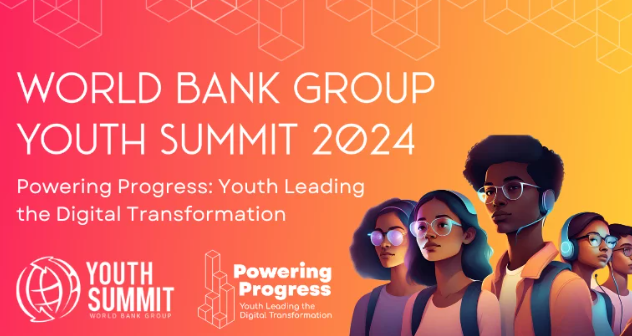By Buertey Francis BOYOR
The World Bank Group (WBG) has held its Youth Summit for 2024 with a focus on digital inclusion, artificial intelligence (AI) and sustainable technology.
This year’s summit – being the eleventh edition – engages the youth on the most pressing topics facing their generation. The global convening also spotlights diverse youth-led initiatives, surfaces key constraints and opportunities for growth and collaboration through dialogues, showcases, pitch events and other interactive sessions.
Its mission is empowering youth to explore innovative ideas that tackle development challenges while providing them with the tools to build and engage in impactful projects. It is also to promote dialogue between youth, the WBG and other key stakeholders globally. It was under the theme ‘Powering Progress: Youth Leading the Digital Transformation’.
The event’s highlight at the World Bank Group head office in Accra was a plenary session by the Ghana Youth Voices (GYV), a chapter of the WBG Youth-to-Youth (Y2Y) community. It was on the topic ‘Connectivity for All: Digital Access and Inclusion for the Next Generation’.
The discussions were devoted to subjects on how digital infrastructure investments can be equitably distributed to close the digital divide, especially in underserved rural and low-income urban areas; how digital platforms and technologies can be designed to be more inclusive for people with disabilities, youth and older adults, ensuring that everyone can benefit from digital advancements; and how the country’s education system can be reformed to better prepare the next generation for a digital world.
The GYV exists to strengthen youth engagement with the WBG Ghana office and lead the conversation on the importance of inclusive youth integration in the country’s development issues within the region.
GYV’s Country Lead, Daniel Owusu, while speaking at the event urged the country’s youth in technology to collaborate and scale up their activities to maximize gains. “Let us do things in collaboration, not in silos, because within the youth bracket there is a lot of competition. Let us position ourselves to leverage on collaboration to scale.”
Franklin Owusu-karikari, Director-Business Support and Policy at the National Entrepreneurship and Innovation Programme (NEIP), highlighting some of the successes chalked up under government’s flagship initiative said it has provided a tax incentive framework for young people between the ages of 18 to 35 to enable them access tax holidays. “We have several areas approved by GRA – including tech, agric, renewable energy and waste management among others – for you to access,” he added.
He further noted that under the Ghana Economic Transformation Project of the World Bank, the NEIP has focused attention on how to strengthen innovation hubs in communities within the various regions to enable them to help prepare start-ups and train entrepreneurs to give them the needed space to grow.
WBG’s youth-support projects in Ghana
With respect to youth-support initiatives, WBG has supported the country’s youth digital transformation agenda under the e-Transform Ghana Project as well as the Ghana Digital Acceleration Project (GDAP) in collaboration with the Ministry of Communication and Digitalisation (MOCD) and other partners.
Additionally, through its re-Start programme, it has trained 1,440 people in digital skills – leading to career pathways in emerging technologies over a period of four months in courses such as data analytics with python, cybersecurity and Microsoft Al among others in Accra, Bolgatanga, Kumasi and Sunyani.
With respect to the eTransform Project, the international organisation has organised training and workshops at several Tech Hubs in the country; holding programmes at the 3 Tech Hubs with a total participation of 33,854 persons made up of 15,275 males and 18,579 females, and many others.
The Youth Summit is the largest annual gathering of youth (aged 18-35) hosted by the World Bank Group worldwide, with activities and engagements in different regions and at its headquarters in Washington DC. The organisation focuses on the following key areas of development: Broadband Connectivity, Access and Use; Digital Data Infrastructure; ICT Industry and Digital Jobs; Digital Safeguards; and Digital climate as well as Accelerating Digital Use Across Sectors
Based on Ghana’s 2021 census, 35% of its population are children (age 0-14) and 38% are youth (age 15-35). While 57% of its total population are under the age 25, its youth unemployment (age 15-25) is 6.68% compared to overall unemployment of 3.6% in 2023.










